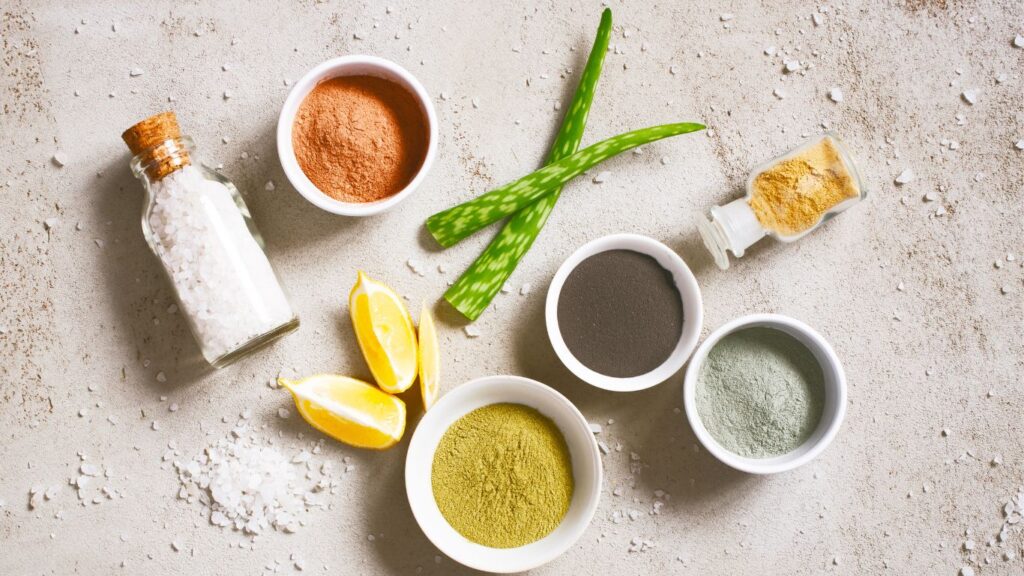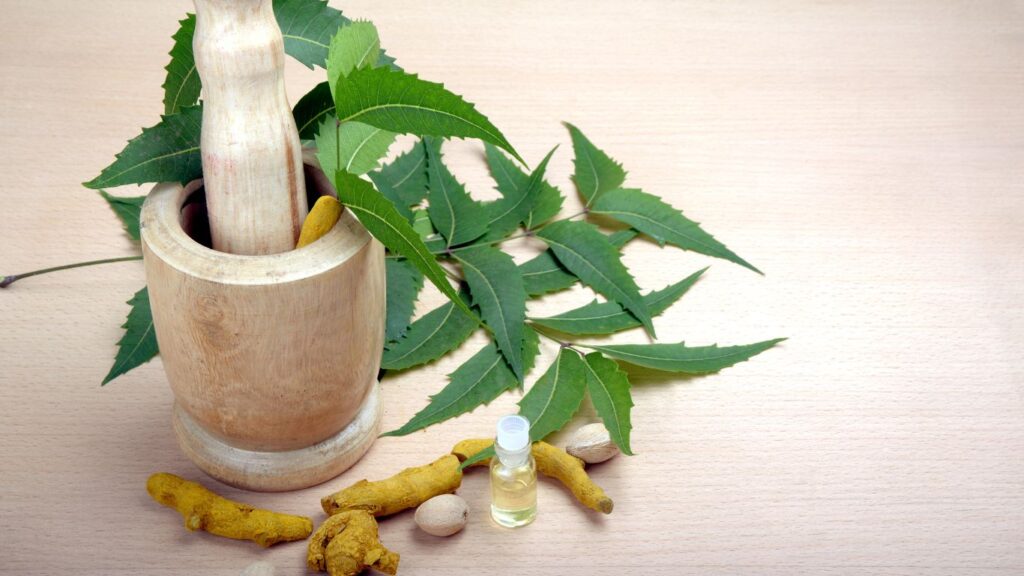
Synthetics, harsh chemicals, and pollution are causing so many negative impacts in our lives today. It’s high time that we try replacing chemicals with natural herbal alternatives, wherever possible.
Nature has blessed us with the everlasting treasure of herbs. There are various herbal ingredients that have the potential for sun protection. Ultraviolet rays from the sun are the major cause of concern which can even cause skin cancer. Protection from UV rays can be achieved by using herbal ingredients having sun screening properties.
Herbs that are rich in vitamins A, C, and E are studied for their sun protection qualities. As compared to synthetic counterparts, herbal products show fewer side effects and are many times effective in chronic conditions. They are also available easily at a lower cost. There are many herbs in Ayurveda too which are frequently used in skin care products for sun protection benefits.

Here are some herbal ingredients and products that are often used for sun protection:
Red Raspberry Seed Oil: It has a natural SPF (Sun Protection Factor) of around 25-50 and is rich in antioxidants that can help protect the skin from UV damage. It is a natural moisturizer too.
Carrot Seed Oil: Contains carotenoids, which offer some UV protection. It is also rich in antioxidants and can help repair sun-damaged skin.
Coconut Oil: While not a high SPF, coconut oil has a natural SPF of around 4-6 and can provide some protection. It is also moisturizing and soothing for the skin.
Shea Butter: Contains natural SPF of about 4-6 and is deeply moisturizing, making it great for soothing sun-exposed skin.
Aloe Vera: Known for its soothing properties, aloe vera can help calm sunburned skin and promote healing.
Green Tea Extract: Rich in antioxidants like polyphenols, green tea extract can help protect the skin from UV damage and reduce inflammation.
Jojoba Oil: Though it does not provide significant sun protection on its own, jojoba oil is often used in sun care products for its moisturizing and skin-soothing properties.
Soybean Oil: Contains antioxidants and can help protect the skin from UV damage, though it is not a high SPF.
Rosemary: It is rich in antioxidants and helps protect from free radical damage and inflammation. Free radicals are responsible for skin aging. These properties make it perfect for sun-protection purposes. Rosemary extract is used in herbal sunscreen for its range of benefits.
Rubia cordifolia (Indian Madder or manjishtha ) is an Ayurvedic medicinal plant in India. The most valuable plant part is its root which has sun protection properties. It protects the skin from pigmentation. Manjishtha is an ingredient in many herbal Ayurvedic sunscreens.
Madhuyashthi or Liquorice: It is a valuable Ayurvedic herb. helps to reduce blemishes and dark spots and can be used as a sunscreen to protect the skin from sunburns and tanning.
When using herbal sun care options, it is important to note that their SPF levels are generally lower than conventional sunscreens. Most of the herbal options are not used as standalone products. Sunscreen mostly uses many of the above ingredients to achieve a formulation that gives good sun protection. Mostly active constituents are extracted from herbs having potent UV shielding effects and used in commercial sunscreens.

Herbal Skin Care for After Effect of Sun
Apart from sunscreen, it is important to take care of your skin after exposure. There are many herbal options for after-sun care too. You can frequently use them at home to reduce the effects of harsh sun on your skin.
Lavender: Lavender essential oil or infused water can be applied to sunburned skin to reduce inflammation and promote healing. Its pleasant aroma also helps in relaxation.
Calendula: Calendula has soothing properties and can help reduce inflammation and redness. It is available in the form of creams, ointments, or infused oils.
Chamomile: Chamomile has excellent calming and anti-inflammatory properties. You can use chamomile tea bags steeped in cool water as a compress or apply chamomile-infused oil to sunburned skin.
Sandalwood paste: Sandalwood powder or oil is often used in Ayurvedic skincare for its cooling and soothing effects. Mixing sandalwood powder with water to form a paste and applying it to sunburned areas can provide relief.
Neem: Neem is renowned for its antibacterial and anti-inflammatory properties. Applying neem oil or a neem-based cream to sunburned skin can help reduce redness and swelling.
Turmeric: Turmeric contains curcumin that has anti-inflammatory and antioxidant qualities. Mixing turmeric powder with yogurt or water to create a paste and applying it to sunburned skin can help soothe irritation. Turmeric is sometimes used with besan (gram flour) along with malai to make ubtan to remove dead skin and moisturize. It is a great after-sun care.
Cucumber: Cucumber has a cooling effect on the skin and can help reduce inflammation. Cut into slices or grate extract some juice from cucumber. Apply to sunburned areas to get some instant relief.
Mint: Mint has a cooling effect on the skin and can help reduce discomfort from sunburn. Crushing fresh mint leaves and applying them directly to sunburned skin can provide relief.
Rose Water: Rose water has anti-inflammatory properties and can help soothe sunburned skin. Spritzing or gently applying rose water to affected areas can provide relief.
Ghee: Clarified butter, or ghee, is deeply moisturizing and can help nourish sunburned skin. Applying a thin layer of ghee to affected areas can provide relief and promote healing.
Purslane (Portulaca): It is a weed rich in antioxidants, vitamins A, C, and E, and anti-inflammatory properties that provide a range of benefits to the skin. Its extract is used in many skincare formulations to soothe skin and anti-aging benefits.
Aloe Vera: Known for its cooling and moisturizing properties, aloe vera gel can soothe sunburned skin and promote healing.
Coconut Oil: Coconut oil is rich in antioxidants and has moisturizing properties. Applying coconut oil to sunburned skin can help reduce inflammation and prevent peeling.
These herbal products help in soothing and healing the skin after exposure to the sun’s rays without the potential side effects of harmful chemicals.